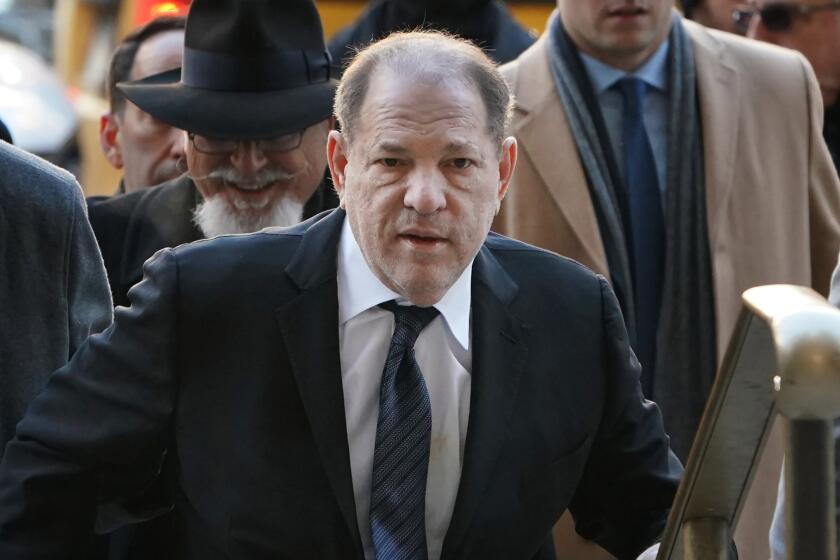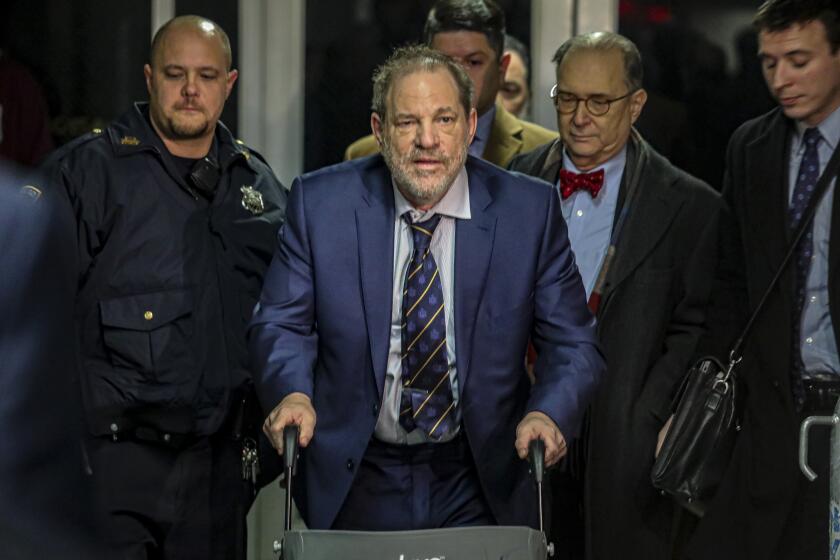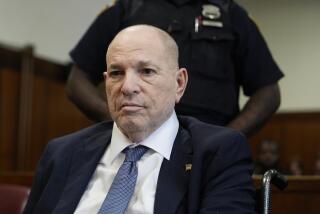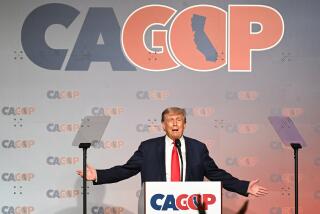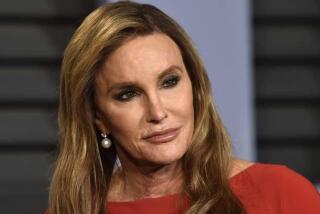Weinstein accusers share relief, tears and hope after verdict
- Share via
Women’s rights groups and actresses who have accused Harvey Weinstein of sexual abuse described feeling an overwhelming wave of relief and camaraderie on Monday after a jury found the producer guilty of one count of rape and one count of committing a criminal sexual act.
During an emotional news conference call hours after the verdict, women from the Silence Breakers, a group comprised of Weinstein’s accusers, expressed gratitude to those who testified in the trial and the dozens of others who have shared their stories.
Zoe Brock, a New Zealand-born former model who was one of six women who filed a class-action suit against Weinstein and the studio he co-founded in 2017, struggled to speak through her tears. She recalled worrying that Weinstein would be exonerated.
“This is a huge day,” she said. “I’m crying right now because I expected the worst. Because for us, the worst keeps happening. In Hollywood, especially for sexual assault victims, the worst keeps happening.”
Actress Rose McGowan, who has alleged that Weinstein raped her in 1997, recalled how over the years, she would repeatedly hear stories of the producer abusing women. For her, the verdict signified a massive change in the culture around sexual abuse.
“For once, he won’t be sitting comfortably,” she said. “For once, he will know what it’s like to have power wrapped around his neck.”
The downfall of Harvey Weinstein was groundbreaking for the entertainment industry. On Monday, a jury convicted Weinstein on two charges. But has Hollywood enacted meaningful change?
The two counts were connected to individual allegations made by Mimi Haley, a former Weinstein Co. production assistant, and Jessica Mann, a once-aspiring actress. Many of the women said the jury saw past a defense that sought to blame the accusers. Weinstein’s attorneys asserted that alleged encounters with Weinstein were consensual and that they were part of efforts by the accusers to obtain favors from the producer.
Dawn Dunning, who testified that Weinstein slipped his hand up her skirt against her will in 2004, said that “the bottom line is you can be in a consensual relationship and still be raped. I think that translated.”
Fatima Goss Graves, the president and CEO of the National Women’s Law Center, said that the #MeToo movement, which stemmed from the accusations against Weinstein, has inspired countless people to tell their own stories of abuse.
“I hope today that they know they made a difference,” she said. “That our culture is changing and that really thanks to the many millions of silence breakers, institutions that really did not want to change are changing.”
Since the accusations against Weinstein came to national prominence in 2017, 13 states have limited or prohibited employers from requiring employees to sign nondisclosure agreements as a condition of employment or as part of a settlement agreement. Five states have also expanded workplace harassment protections to include independent contractors, interns or graduate students, according to the National Women’s Law Center.
“It’s really important that we have laws and institutions that match their [the accusers’] energy,” Goss Graves said.
The verdict in Weinstein’s New York rape trial could help L.A. County prosecutors secure a conviction against the disgraced movie mogul in California.
Sasha Ahuja, the acting chief executive at Girls for Gender Equity, a Brooklyn-based organization, said that she hopes the verdict instills urgency to create supportive networks for victims of sexual violence who are not comfortable approaching law enforcement.
“We are hoping that all survivors, regardless of their access to resources — whether it’s law enforcement or attorneys — that they always feel they can come forward too,” she said. That it’s not just folks in Hollywood, but everyday people, who have everyday experiences of sexual violence and harm.”
Weinstein was acquitted on the two most serious charges of predatory sexual assault, which each carried a potential life sentence. In a written statement, #MeToo movement founder Tarana Burke said that although Weinstein was not convicted of all counts, he will now have to answer to his crimes.
“This case reminds us that sexual violence thrives on unchecked power and privilege,” she said. “The implications reverberate far beyond Hollywood and into the daily lives of all of us in the rest of the world.”
More to Read
Sign up for Essential California
The most important California stories and recommendations in your inbox every morning.
You may occasionally receive promotional content from the Los Angeles Times.
